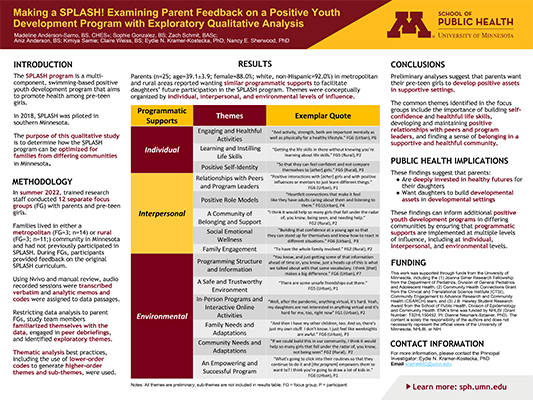Madeline Anderson-Sarno, Sophie Gonzalez, Zach Schmit
MPH, Community Health Promotion
Co-authors:
Aniz Anderson BS; Kimiya Samie; Zach Schmit, BASc; Claire Weiss, BS; Eydie N. Kramer-Kostecka, PhD; Nancy E. Sherwood, PhD
Advisor:
Nancy Sherwood and Eydie Kramer-Kostecka
Keywords:
Parent-assessed youth program; developing life skills
Abstract
Introduction: SPLASH is a multi-component, swimming-based positive youth development program that aims to promote health among pre-teen girls. In 2018, SPLASH was piloted in southern Minnesota. The purpose of this qualitative study is to determine how the SPLASH program can be optimized for families from differing environments.
Methods: In summer 2022, trained research staff conducted separate focus groups (FG) with parents and pre-teen girls; families lived in either a metropolitan (FG=3; n=14) or rural (FG=3; n=11;) community in Minnesota and had not previously participated in SPLASH. During FGs, participants provided feedback on the original SPLASH curriculum. Using Nvivo and manual review, audio recorded sessions were transcribed verbatim and analytic memos were assigned to data passages. Restricting data analysis to parent FGs, seven study team members familiarized themselves with the data, engaged in peer debriefings, and identified exploratory themes across rural and urban spaces.
Results: Parents in urban and rural areas reported wanting similar programmatic support needs to facilitate daughters’ future participation in SPLASH. Themes were conceptually organized by developmental assets (individual: learn about health, build self-confidence and healthful life skills; interpersonal: develop and sustain positive relationships with peers and program leaders) and settings (find belonging in a healthful and supportive community).
Conclusions: Preliminary analyses suggest that parents want their pre-teen girls to develop positive assets in supportive settings. Future work will use thematic analysis best practices, including the use of lower-order codes to generate higher-order themes and sub-themes, to expand on preliminary findings.

View Poster (PDF)
